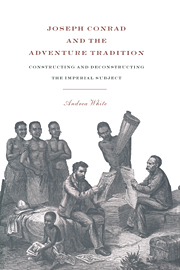Book contents
- Frontmatter
- Contents
- Acknowledgments
- Introduction
- 1 Constructing the imperial subject: nineteenth-century travel writing
- 2 Adventure fiction: a special case
- 3 Them and us: a useful and appealing fiction
- 4 The shift toward subversion: the case of H. Rider Haggard
- 5 Travel writing and adventure fiction as shaping discourses for Conrad
- 6 Almayer's Folly
- 7 An Outcast of the Islands
- 8 The African fictions (I): “An Outpost of Progress”
- 9 The African fictions (II): “Heart of Darkness”
- Coda
- Notes
- Bibliography
- Index
9 - The African fictions (II): “Heart of Darkness”
Published online by Cambridge University Press: 10 December 2009
- Frontmatter
- Contents
- Acknowledgments
- Introduction
- 1 Constructing the imperial subject: nineteenth-century travel writing
- 2 Adventure fiction: a special case
- 3 Them and us: a useful and appealing fiction
- 4 The shift toward subversion: the case of H. Rider Haggard
- 5 Travel writing and adventure fiction as shaping discourses for Conrad
- 6 Almayer's Folly
- 7 An Outcast of the Islands
- 8 The African fictions (I): “An Outpost of Progress”
- 9 The African fictions (II): “Heart of Darkness”
- Coda
- Notes
- Bibliography
- Index
Summary
In contemporary reviews of Youth (1902), most readers responded primarily to the title story in that volume, preferring it to the other two, “Heart of Darkness” and “The End of the Tether.” John Masefield, who would become England's Poet Laureate in 1930, found that “Youth” was not only the best of the three but “the best thing Mr. Conrad has done.” He found the narrative of “Heart of Darkness” “most unconvincing,” for it was “not vigorous, direct, effective, like that of Mr. Kipling,” nor was it “clear and fresh like that of Stevenson” (Sherry (ed.), Conrad, p. 142). Again, as was the case with Conrad's earlier fictions, the standard against which this work was measured, one that spoke of exotic adventures in the nation's imperial outposts, was the adventure fiction of the day. On those terms, “Youth” was the favorite and, judged by familiar standards, very satisfying. But if the book had been published as Conrad had first hoped, as a trilogy of Marlow stories, readers might have seen that “Youth” was meant to sound the note which “Heart of Darkness” and “Jim” answered. Remembering Conrad's hope for Three Tales of Land and Sea, a volume that he regretfully abandoned, argues for reading the two remaining Marlow stories in Youth, not independently of one another, but in each others' company as dialogic voices arguing for a more complex vision of adventure than the monologic tellings of contemporary adventure fiction had heretofore admitted.
- Type
- Chapter
- Information
- Joseph Conrad and the Adventure Tradition , pp. 167 - 192Publisher: Cambridge University PressPrint publication year: 1993



